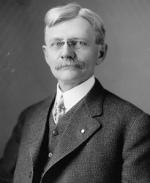Disable ads!
Thomas R. Marshall
Thomas Riley Marshall (March 14, 1854 – June 1, 1925) was an American Democratic politician who served as the 28th Vice President of the United States (1913–1921) under Woodrow Wilson. A prominent lawyer in Indiana, he became an active and well known member of the Indiana Democratic Party by stumping across the state for other candidates and organizing party rallies that later helped him win election as the 27th Governor of Indiana. In office, he proposed a controversial and progressive state constitution and pressed for other progressive era reforms. The Republican minority used the state courts to block the attempt to change the constitution. His popularity as governor, and Indiana's status as a critical swing state, helped him secure the Democratic vice presidential nomination on a ticket with Wilson in 1912 and win the subsequent general election. An ideological rift developed between the two men during their first term, leading Wilson to limit Marshall's influence in the administration, and his brand of humor caused Wilson to move Marshall's office away from the White House. During Marshall's second term he delivered morale-boosting speeches across the nation during World War I and became the first vice president to hold cabinet meetings, which he did while Wilson was in Europe. While he was president in the United States Senate, a small number of anti-war senators kept it deadlocked by refusing to end debate. To enable critical wartime legislation to be passed, Marshall had the body adopt its first procedural rule allowing filibusters to be ended by a two-thirds majority vote—a variation of this rule remains in effect. Marshall's vice presidency is most remembered for a leadership crisis following a stroke that incapacitated Wilson in October 1919. Because of their personal dislike for him, Wilson's advisers and wife sought to keep Marshall uninformed about the president's condition to prevent him from easily assuming the presidency. Many people, including cabinet officials and Congressional leaders, urged Marshall to become acting president, but he refused to forcibly assume the presidency for fear of setting a precedent. Without strong leadership in the executive branch, the administration's opponents defeated the ratification of the League of Nations treaty and effectively returned the United States to an isolationist foreign policy. Well known for his wit and sense of humor, one of Marshall's most enduring jokes came during a Senate debate in which, in response to Senator Joseph Bristow's catalog of the nation's needs, Marshall quipped the often-repeated phrase, "What this country needs is a really good five-cent cigar", provoking laughter. After his terms as vice president, he opened an Indianapolis law practice, where he authored several legal books and his memoir, Recollections. He continued to travel and speak publicly. Marshall died while on a trip after suffering a heart attack in 1925.
 Read more on wikipedia.org Read more on wikipedia.org
 All quotes by Thomas R. Marshall All quotes by Thomas R. Marshall
 Edit Edit
|

|
|
|
|
|
Background photo by Giuliana
|